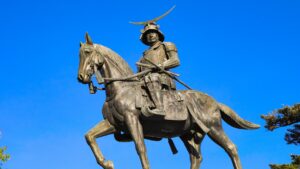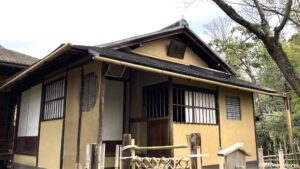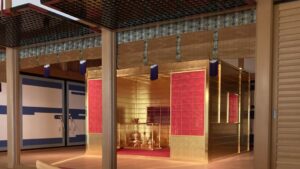Zuihoden Mausoleum of the One-Eyed Dragon, Date Masamune: The Great Samurai's Legacy and Beliefs
The Zuihouden stands as the mausoleum of the renowned warlord of Date Masamune. It embodies the quintessential beauty of the Momoyama decorative style, perfectly reflecting the flamboyant nature of Masamune himself. His final poem encapsulates his life: “I have journeyed through the warring states with unwavering beliefs, like the moon shining in the dark.” In […]
Cherry blossoms and red leaves at Hakodate Goryokaku Fort
Goryokaku Fort (五稜郭) is Japan’s first western-style star fort located in Hakodate. The view from the top of the observatory, situated 90 meters above the ground of Goryokaku Park Tower, offers a truly spectacular sight. The iconic five-star shape, filled with approximately 1,600 cherry blossom trees in spring and adorned with vibrant autumn leaves in […]
Samurai tea ceremony in Japan, Joan is the best teahouse to visit
There are three existing tea rooms in Japan designated as national treasures. They are the Taian at Myokian in Kyoto built by a tea master, Sen-no-Rikyu, the Mittan at Daitokuji Temple by Kobori Enshu, and the Joan at Yurakuen Garden in Aichi prefecture by Oda Nagamasu in his later life. Oda Nagamasu, also known as […]
Daisen Kofun, one of the world's three largest tombs of Emperor Nintoku along with King Khufu's Pyramid and Quing Emperor's Mausoleum
Identified as the mausoleum of the 16th Emperor Nintoku (4th - 5th century, 仁徳天皇), the Nintoku-Tenno-Ryo Tumulus is the largest keyhole-shaped tumulus in Japan, measuring approximately 486 meters in length and 249 meters in diameter for the burial mound, which has a three-tier structure. The tumulus is comparable in size to the Pyramid of Khufu […]
The Golden Tea Room & Taian Tea Room
The walls, pillars, ceiling, and tea utensils covered in gold leaf reflect a solemn scarlet color in the Golden Tea Room through the scarlet woolen cloth on the Shoji screen. In contrast, Taian in Myokian Temple, a National Treasure, is the oldest existing tea room and one of three tea rooms of national treasures (Taian, […]




_169sakai-city-300x169.jpg)
